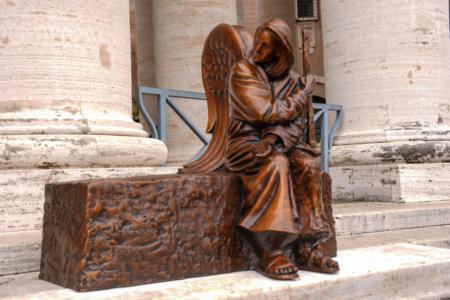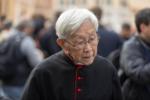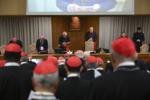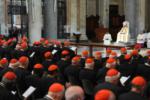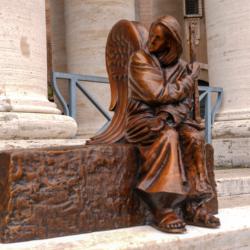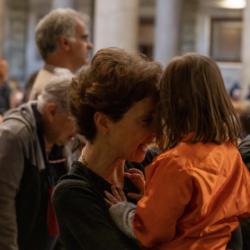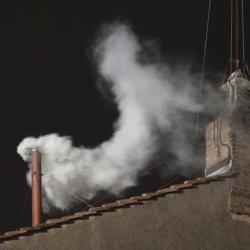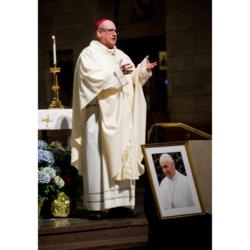Chancellor refutes charges of cemetery mismanagement
Chancellor David Smith is refuting claims that the Archdiocese of Boston has violated state law by not properly maintaining and providing for the future of archdiocesan cemeteries.
Smith called a complaint issued by Secretary of State William F. Galvin on Aug. 3, “baseless accusations” that “do not serve the interest of the public.” Smith asserted that the archdiocese and The Catholic Cemetery Association of Boston are proud of their well-maintained cemeteries.
Galvin’s securities division, which was given jurisdiction over trust funds last year, conducted interviews with over 40 different cemetery associations, Galvin told The Pilot on Aug. 9.
Galvin added that, during this process, the division discovered that The Catholic Cemetery Association had failed to properly maintain the cemeteries, leaving many in disrepair with toppled headstones and overgrown grass. The division also found that the association did not have sufficient funds set aside for the perpetual care of its 22 cemeteries and had not set up a required trust fund for that purpose.
The division filed a complaint —citing both their own findings and a study by an Arizona consulting firm commissioned by the archdiocese four years ago— that called for the association to establish a separate, secure account for the perpetual care of its cemeteries.
Not only does the association not have a fund, but the organization was also unwilling to establish one, while other cemetery associations were compliant and “sought to resolve” problems by establishing trusts or better funding them, Galvin said.
"The attitude we received from the archdiocese was that they weren't going to comply, so we must take remedial action," he said. "They don't think the law applies to them."
The complaint, which the archdiocese has three weeks to officially respond to, will go before an independent hearing officer, appointed by his securities division, he added.
Smith answered these allegations by saying that the association has nearly $28 million in a mutual fund for the perpetual care of its cemeteries. This amount has steadily grown over the past five years and will continue to grow. It could have increased more, but the association has spent millions of dollars on upkeep and improvements of the cemeteries, he said. Part of perpetual care means maintaining the graveyards, he added.
Smith also pointed to a provision of state law that exempts cemeteries owned by religious organizations and cemeteries established before 1936, which includes a vast majority of the association’s cemeteries. Additionally, the law does not require any cemetery to set up a trust fund, he said.
The law states that a cemetery “may hold funds in trust” and use income for care of the cemetery or establishing more lots. Within the section cited by the complaint against the association, the law reads: “The provisions of this section shall not apply to any cemetery established prior to July 1, 1936, or to any cemetery owned, maintained and operated by a church or religious society.”
The complaint said that the legislature in using the word “may” grants permission to cemeteries to put funds in trust, which would not ordinarily be legal because private cemetery corporations are not considered charitable organizations. Furthermore, the complaint states that The Cemetery Association promises those purchasing lots to put away 10 percent toward perpetual care, which forms an implicit trust.
"Even if the perpetual care funds were not initially established by a separate trust instrument, payments for the perpetual care of cemetery lots and plots have been found by the courts to be implied or constructive trusts," the complaint said.
The Cemetery Association does not promise anyone that 10 percent of funds will be held for perpetual care, but it is the organization’s policy to put around that amount in a mutual fund for the perpetual care of the cemeteries, Smith said. The Cemetery Association invests in a fund with other Catholic groups of the archdiocese in order to reduce risk, cut down on brokerage fees, and preserve Catholic values by investing in companies in line with those values. Placing perpetual care money in a separate trust would deprive the Cemetery Association of these benefits, he added.
According to Galvin, the mutual fund is “not appropriate” because it is not a secure account and can be invaded for other purposes. The complaint cites a loan to St. John’s Seminary in 2003, which was repaid along with a $750,000 fee on July 1, 2004.
Smith defended the loan, saying that the seminary had separate counsel when applying for the loan and that the association made more money from the loan than it would have if that money had stayed in the mutual fund.
Although the association pools its investments with other Catholic organizations of the archdiocese, Smith maintained that it is a separate organization with its own accounting, payroll and bank accounts. Additionally, the archdiocese charges the association for using the common investment fund, he said.
"There's absolutely no commingling of funds," he said.
The complaint pointed to the consulting firm’s study and poor condition of the association’s cemeteries as reasons for issuing the complaint against the archdiocese, although, Galvin said all different types of associations, including those run by municipalities and other religious organizations, were interviewed.
The complaint faulted the association for overgrown grass and toppled headstones at several cemeteries.
At any graveyard there will be a few sites that need attention, and older cemeteries often have headstones in disrepair, Smith said. Headstones are private property that belong to the family and can be a safety hazard at any cemetery if they are leaning or crumbling. Older markers tend to be made out of limestone or slate instead of granite and were built before the requirement of foundations. Sometimes they are laid flat to prevent them from toppling over on someone, he said.
"Headstones are a continuing issue," said Smith.
During the interviews with the securities division, Smith invited members to tour the cemeteries so that they could see the work and improvements being done, but his offer was declined, he said. The Arizona consulting firm study was commissioned by the archdiocese in order to determine how The Cemetery Association was doing, he added.
"Where we're not good, we're getting better," he said. "We have to maintain these cemeteries forever. Perpetual is a long time."
When Smith began overseeing the operations of archdiocesan cemeteries more than 10 years ago, he faced many complaints about the cemeteries such as fences and roads in disrepair. The association had acquired most of its cemeteries from parishes with financial difficulties.
"Many of them came to us with deficiencies, or shortages of cash, or both," he said.
Parishes had trouble maintaining their cemeteries because of labor and equipment costs. The association is able to pool resources and maintain many cemeteries, which allows them to hire more full-time employees. But 10 years ago, the association did not have the proper tools and equipment to maintain the cemeteries efficiently, Smith said.
Since then the association has invested in backhoes, lawn mowers and a garage so that they can do their own maintenance on the equipment. It has also spent $3.5 million on building improvements, roads, restoration projects and technology, he said.
The complaints have almost dropped off completely, Smith added.
The association balances the cost of maintenance and improvements with money set aside for perpetual care, he continued. Money must be spent in order to make money and continue to have more clients, he said.
A vast majority of the cost of running cemeteries is labor, he said. The association currently employs 100 people for the summer, he added.
During a tour with Smith on Aug. 8 of several archdiocesan-run cemeteries, The Pilot found workers at St. Mary Cemetery in Lynn busy mowing and watering the grass near a repainted statue and a restored chapel. Several thousand new burial plots will soon go in across the street at St. Joseph Cemetery.
Maintenance and new construction are everyday activities at each cemetery, Smith said. The foundation for a new mausoleum was dug at Holy Cross Cemetery in Malden. Already on the property is the largest mausoleum in Massachusetts and features marble, heating, air conditioning, security cameras and a chapel with a state of the art sound system.
The new crypts and burial plots created during the improvements will be sold and the capital will be reinvested to ensure the future financial success of the association, Smith said.
"We reinvest the capital back into the business," he added.
But work is not limited to cemeteries where some of the total 3,000 annual burials take place, Smith said. At St. Francis de Sales Cemetery in Charlestown, which has not seen a new burial in generations, the association spent $60,000 to rebuild a supporting wall that was bulging because the granite came loose.
"We did it because it was the right thing to do," Smith said.
